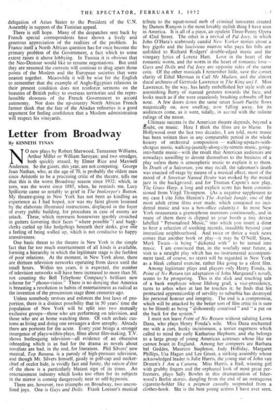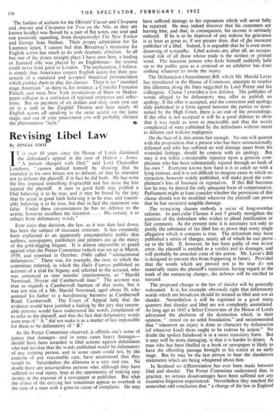Letter from Broadway
By KENNETH TYNAN
N0 new plays by Robert Sherwood, Tennessee Williams, Arthur Miller or William Saroyan; and two smudges, both quickly erased, by Elmer Rice and Maxwell Anderson. So the giants, this year, are not competing. George Jean Nathan, who, at the age of 70, is probably the oldest man since Aristotle to be a practising critic of the theatre, tells me that this is the worst Broadway season since 1932; which, in turn, was the worst since 1885, when, he reminds me, Lucy Spillicote came so notably to grief in The Innkeeper's Button. My theatre-going in New York has not been as kindling an experience as I had hoped, nor was my faint gloom lessened by the elaborate illustrated instructions, displayed in the foyer of every public building, for procedure in case of enemy air attack. These, 'which represent housewives ignobly crouched in gutters (covering their faces "where possible ") and bank- clerks curled up like hedgehogs beneath their desks, give one a feeling of being walled up, which is not conducive to happy attentiveness.
One basic threat to the theatre in New York is the simple fact that far too much entertainment of all kinds is available, forming a hierarchy in which the legitimate stage is the feeblest of poor relations. At the moment, in New York alone, there are thirteen television networks operating from dawn until the small hours. Within ten years, it is expected, the number of television networks will have been increased to more than 50, not counting the Bell Telephone Company's brilliant new scheme for " phono-vision." There is no denying that America is breasting a revolution in habits of entertainment as radical as the invention of the proscenium stage three centuries ago.
Unless somebody revives and enforces the lost laws of pro- portion, there is a distinct possibility that in 50 years' time the population of New York will be split into two mutually exclusive groups—those who are performing on television, and those who are at home watching them. Of such archaic cus- toms as living and doing one envisages a slow atrophy. Already there are portents for the acute. Every year brings a stronger insurgence of plays-within-plays, films about film-making, T.V. shows burlesquing television—all evidence of an obsessive inbreeding which is as bad for the drama as novels about novelists are bad, in the end, for literature. Phil Silvers' new musical, Top Banana, is a parody of high-pressure television, and though Mr. Silvers himself, gaudy in golf-cap and necker- chief of ocelot hide, is vividly fast and funny, the raisOn d'être of the show is a particularly blatant sign of its times. An entertainment industry which looks too often for its subjects in the mirror is coming dangerously near to self-hypnosis.
There are, however, two triumphs on Broadway, two uncon- fined joys. One is Guys and Dolls. Frank Loesser's musical tribute to the squat-nosed mob of criminal innocents created by Damon Runyon is the most lovably stylish thing I have seen in America. It is all of a piece, an opulent Three-Penny Opera of 42nd Street. The other is a revival of Pal Joey, in which John O'Hara's scabrously candid New Yorker stories about a boy gigolo and the lascivious matron who pays his bills are unfolded to Richard Rodgers' double-edged music and the vinegary lyrics of Lorenz Hart. Love in the heart of the romantic worm, and the worm in the heart of romantic love— Guys and Dolls and Pal Joey are opposite sides of the same coin. Of the other musicals I remember little, save the cornet clarity of Ethel Merman in Call Me Madam, and the almost ducal archness,of Gertrude Lawrence in The King and I. Miss Lawrence, by the way, has lately embellished her style with an astonishing, flurry of manual gestures towards the face, and looks much as if she were ceaselessly brushing cobwebs off her nose. A few doors down the same street South Pacific flows majestically on, now swelling, now falling away, for its audiences come, as it were, tidally, in accorii with the infinite rulings of the moon.
Ultimate success in the American theatre depends, beyond a Toubt, on music. Here I think the films are to blame. In Hollywood over the last two decades, I am told, more music has been written than in any comparable period in the whole history of orchestral composition — walking-upstairs-with- shotgun music, walking-jauntily-along-city-streets music, going- into-battle music—with the result that American audiences are nowadays unwilling to devote themselves to the business of a play unless there is atmospheric music to explain it to them. In Death of a Salesman, you may recall, the salesman's death was enacted off-stage by means of a musical effect; most of the mood of A Streetcar Named Desire was evoked by the muted jazz in the background; and for Truman Capote's new play, The Grass Harp, a long and explicit score has been commis- sioned from Virgil Thompson. (As a negative supplement to my case I cite John Huston's The -Asphalt Jungle, one of the most adult crime films ever made, which contained no inci- dental music and was a box-office calamity.) In most New York restaurants a gramophone murmurs continuously, and in many of them there is clipped to your booth a tiny device labelled "Personalised Music," into which you insert a dime to hear a selection of soothing records, inaudible beyond your immediate neighbourhood. And twice or thrice a week news comes that another book or play—it may be O'Neill, Shaw, Mark Twain—is being "dickered with" to be turned into music. I am convinced that, in the woefully near future, a visit to a straight play which has no instrumental accompani- ment (and, of course, no stars) will be regarded in New York as a bleak cultural exercise, rather like going to a silent film.
Among legitimate plays and players only Henry Fonda, in Point of No Return (an adaptation of John Marquand's novel), seems to be prospering. This is the slick and touching tale of a bank employee whose lifelong grail, a vice-presidency, turns to ashes when at last he touches it; he finds that his protracted apprenticeship of servility to suburbia has destroyed his personal honour and integrity. The end is a compromise, which will be attacked by the better sort of film critic (it is sure to be filmed) as being "dishonestly contrived" and "a pat on the back for the system."
I must not leave Point of No Return without saluting Leora Dana, who plays Henry Fonda's wife. Miss Dana enchanted me with a curt, husky incisiveness, a terrier eagerness which called to mind the early Katharine Hepburn; and she belongs to a large group of young American actresses whose like we cannot boast in England. Among her compeers are Barbara bel Geddes, Maureen Stapleton, Judy Holliday, Margaret Phillips, Uta Hagan and Lee Grant, a striking assembly whose acknowledged leader is Julie Harris, the young star of John van Druten's I Am a Camera. Miss Harris, a frail, winning girl with grubby fingers and the orphaned look of most great per- formers, plays Sally Bowles in this dramatisation of Isher- wood's Berlin stories, dangling from the end of an outrageous cigarette-holder like a peignoir casually suspended from a clothes-hook. She is the best young actress I have ever seen. The fanfare of acclaim for the Oliviers' Caesar and Cleopatra and.Antony and Cleopatra (or Two on the Nile, as they ate known locally) was flawed by a pair of flat notes, one sour and one positively squealing, from (respectively) The New Yorker and George Jean Nathan. Their proper admiration for Sir Laurence apart, I cannot feel that Broadway's reverence for English actors has much to do with dramatic criticism. In all but one of the dozen straight plays 1 have seen here, a leading or featured role was played by an Englishman : the reverse could never hold good in London. The explanation.' believe, is simply that Americans respect English actors for their pos- session of a standard and accepted theatrical pronunciation which enables them to play the classics. There is no "standard stage American" as there is, for instance, a Comedie Francaise French, and most New York productions of Shaw' or Shakes- peare collapse in a confusion of regional overtones and inflec- tions. But on payment of six dollars and sixty cents you can sit in a stall at the Ziegfeld Theatre and hear nearly 40 English actors all speaking in the same accent on the same stage; and out of your amazement you will probably christen the phenomenon "style."



































 Previous page
Previous page